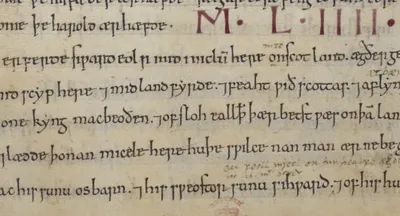Dead Language Society. A weekly newsletter on the hidden history of English. Join 37,000+ readers.
Subscribe on Substack →This is the second in a series of Old English readings. If you haven't read the first yet, start there.
Like the previous text, this text is lightly adapted from Sweet's reader.
I have added explanatory notes for:
- All the words that did not appear in the previous reading,
- All words not on the basic vocabulary list
- All grammar points that might be tricky for a beginner
Happy reading!
Matthew 12:18–21
Today's reading is from the Gospel of Matthew. Here is the complete text.
Hēr is mīn cnapa, þone iċ ġeċēas; mīn ġecorena, on þām wel ġelīcode mīnre sāwle. Iċ āsette mīnne gāst ofer hine, and dōm hē bodaþ þēodum. Ne flīt hē, ne hē ne hrȳmþ; ne nān mann ne ġehȳrþ his stemne on strǣtum. Tōcwȳsed hrēod hē ne forbrȳt, and smēocende fleax hē ne ādwǣsċþ, ǣr þām þe hē āwurpe dōm tō siġe. And on his naman þēoda ġehyhtaþ.
Let's break it down into more manageable parts.
Hēr is mīn cnapa, þone iċ ġeċēas;
Here is my servant, whom I have chosen;
- hēr here.
- is is. 3rd person singular present form of wesan to be.
- cnapa boy, young man; servant.1
- þone whom. Accusative singular form of the definite article sē he.2
- iċ I.
- ġeċēas chose. 1st person singular past form of ġeċēosan to choose.3
mīn ġecorena, on þām wel ġelīcode mīnre sāwle.
my chosen one, in whom my soul has been well pleased.4
- ġecorena chosen (one). Nominative singular masculine weak form of ġecoren, the past participle of ġeċēosan to chose
- þām whom. Dative singular form of the definite article sē he.
- wel well.
- ġelīcode it was pleasing. 3rd person past form of ġelīcan/ġelīcian to delight, please.5. Grammatically, an impersonal form: on X ġelīcode Y in X it was pleasing to Y, but best translated in a more idiomatic way, such as X was pleasing to Y.
- mīnre. Dative singular feminine form of mīn my. Agreeing with the feminine noun sāwol soul.
- sāwle soul. Dative singular form of sāwol soul.
Iċ āsette mīnne gāst ofer hine,
I will place my spirit over him,6
- āsette (I) place. 1st person singular present from of āsettan to place, set up.
- minne my. Accusative singular masculine form of mīn my. Agreeing with the masculine noun gāst spirit.
- gāst spirit.
- hine him, accusative singular governed by ofer over.
and dōm hē bodaþ þēodum.
and judgement he will proclaim to the nations.
- dōm judgement; law.
- hē he.
- bodaþ (he) proclaims. 3rd person singular present form of bodian to proclaim, tell; show.
- þēodum to (the) nations. Dative plural form of þēod nation.
Ne flīt hē, ne hē ne hrȳmþ,7
He will not contend, nor will he shout,
- flīt (he) contends. 3rd person singular present form of flītan to contend, strive.
- ne... ne. Multiple negation is used for emphasis, not to negate the negation and thereby make a positive.
- hrȳmþ (he) shouts. 3rd person singular present form of hrȳman/hrīeman to shout, scream.
ne nān mann ne ġehȳrþ his stemne on strǣtum
nor will any person hear his voice in the streets.
- nān not... one; not... any. Ne... ān.
- stemne voice. Accusative singular of stemn/stefn voice.
- strǣtum streets. Dative plural of strǣt street, road, governed by on in.
Tōcwȳsed hrēod hē ne forbrȳt,
A bruised reed he will not break,
- tōcwȳsed bruised. Past participle of tōcwȳsan/tōcwīsan to shatter, crush; bruise.
- hrēod reed.
- forbrȳt (he) breaks. 3rd person singular present form of forbryttan to break, smash, crush.
and smēocende fleax hē ne ādwǣsċþ,
and smoking flax he shall not extinguish,
- smēocende smoking. Present participle of smēocan to (give off) smoke.
- fleax flax.
- ādwǣsċþ (he) extinguishes. 3rd person singular present form of ādwǣsċan to extinguish, quench.
ǣr þām þe hē āwurpe dōm tō siġe.
until he has sent forth judgement to victory.
- ǣr þām þe before, until.
- āwurpe (he) sent forth. Singular past form of āweorpan to cast off, cast away; send forth.
- tō to
- siġe victory
And on his naman þēoda ġehyhtaþ.
And in his name the nations will trust.
- naman name. Dative singular of nama name, governed by on in.
- ġehyhtaþ (they) trust. Plural present form of ġehyhtan to trust.
References
- Sweet, Henry (1879). An Anglo-Saxon Reader in Prose and Verse. Oxford: Clarendon.
Footnotes
-
Cnapa servant is related to Present-Day English knave, which is descended from the OE form cnafa servant. ↩
-
Recall from the previous reading that the definite article can be used as a relative pronoun, as it is here, referring back to cnapa. ↩
-
Sometimes the Present-Day English seems to require a present perfect form have V-ing when translating the Old English simple past. ↩
-
Literally, in whom it has been well pleasing to my soul. See the note under ġelīcode for details. ↩
-
It is easy to confuse ġelīcian to delight, please with ġelīċian to imitate; to compare, liken, especially in texts which do not mark the palatals. ↩
-
Grammatically, the verbs in this sentence (and most of the following lines) are in the present tense. But, as Old English had no separate future tense, the present tense sometimes expressing future meaning. This is also sometims true in Present-Day English: We leave tomorrow. Here we have good reason to translate āsette as will place and bodaþ as will proclaim because the Latin original that this is a translation of has future forms ponam will place and nuntiabit will proclaim. ↩
-
Note that the word order with the negative marker ne is often verb-second: hē flīt he contends, but ne flīt hē he does not contend. ↩


